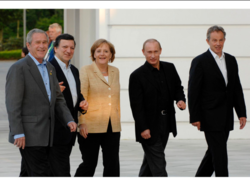Meritocracy
(ideology, ruling technique) | |
|---|---|
 Meritocracy in practice. From the G8 summit in 2007. Next to President GW Bush were handpicked Global Leaders for Tomorrow 1993 who become leaders of their countries: José Barroso, Angela Merkel, Vladimir Putin and Tony Blair. | |
| Meritocracy literally means that those who have earned merit through achievement are legitimized to exercise power. There is a circularity in this definition, for what merit could be greater than that of belonging to the possessing and ruling class? |
Meritocracy literally means that those who have earned merit through achievement are legitimized to exercise power. There is a circularity in this definition, for no merit could be greater than that of belonging to the possessing and ruling class.
The nature of political "leaders" and the state of "democracy" in the 21st century does not inspire faith in its claim to be a meritocracy.
Official narrative
The claim of meritocracy is not only a part of the official narrative of modern "democracy", but a part of an even more fundamental concept, that of hierarchy.
Official opposition narrative
The belief in the merits of meritocracy, in which the social status of a person is determined by the individual achievements, is so deeply rooted in our culture that we no longer even notice it as an ideology - thus people will still support meritocracy in principle, and presume the only problem is with the present corrupt system is that it is "imperfectly implemented".
Criticism
Meritocracy leads to those who are not among the socially fortunate in a society attributing the causes of their situation to themselves. It therefore generates fear and shame-triggering feelings of failure in a large part of the population. However, these feel not attributed to unjust social conditions and are not converted into social energy for change. Rather, the social conditions, which can no longer be recognized as something that can be overcome and changed, are shifted inward. The fear of failure becomes an internal fear that can create paralyzing shame and thereby contribute to depoliticization. [1]
The psychologist Rainer Mausfeld described it as:
The ideology of meritocracy belongs to "those strategies whose purpose is to justify things as they are". In capitalist democracies, the ideology of meritocracy serves to justify the status quo of rule by the haves and to bring acceptance and approval from the have-nots, by instilling in them the hope that with sufficient effort, their social status could improve. Such an ideology of a meritocracy suggests that one's own social position is determined by talent and achievement and that in this sense society is fair. In fact,however, it is not "the efforts of the individual, his intelligence, his vision, his willingness to take risks" that determine social success: For success in today's society, it is much more important to be on good terms with the powerful than through one's own effort[2]